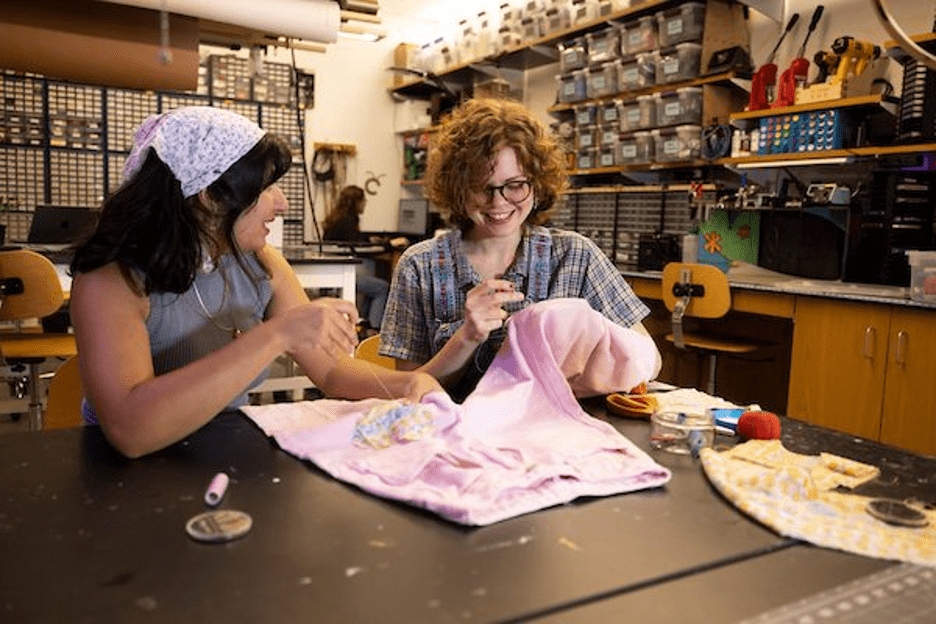In this issue: Sustainable Futures Framework | Campus Sustainability | Climate Resilience & Environmental Justice | Academics: What’s Now and What’s Ahead | Funding & Recognition
The Office of Sustainability:
- Sarah Fortner, Ph.D., Director of Sustainability
- Amanda Sames, Ph.D., Farm Manager
- Rob Hanson, Manager of Campus Energy, Facilities
- Demetrius Blackmon-Jimenez ‘24, 5th year Educational Associate, Coordinator
- Sustainability Assistants: Juliana Baldo ’25, Nico Bolling ’27, Grace Basseckle ’25, Alex Dudnyk ’27, Sadie DiCarlo ’25, Lillian Fisher ’25, Farren Groom ’27, Io Harris ’26, Audrey Moyer ’27, Elena Prichard ’25, Eli Watt ’24, James Zhang ’26
- Farm Interns: (Outgoing) George Perry ’27, Aley Zimmerman Comas ’27, (Incoming) Maeve Clover ’28, Daniel McGovern ’26, Megan Roesler ’26
Sustainable Futures Framework
During the fall of 2024, the Carleton Board of Trustees approved the Sustainable Futures Framework that articulates three goals for our “campus-to-community” vision. These include:
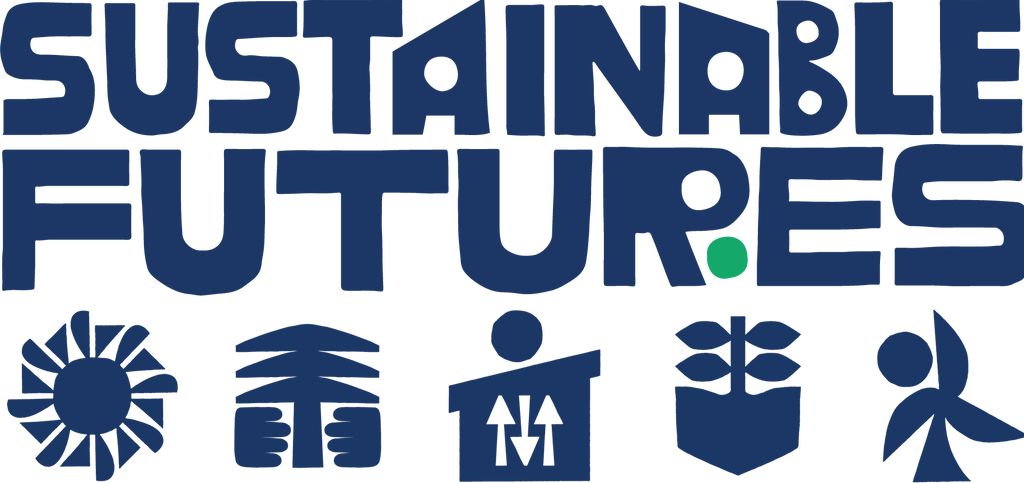
- Equip Carleton students with the interdisciplinary, place-based skills and knowledge needed to advance sustainability and environmental justice, preparing them to engage for change where they live now and in their future communities.
- Deepen Carleton’s commitments to climate action, nature, resilience, and environmental justice by expanding high-impact opportunities for students to engage with solutions and collaborate with partners in Northfield and Rice County, and with nearby Indigenous Nations.
- Continue Carleton’s leadership in emissions reductions on campus, and collaborate on and beyond campus to accelerate climate action.
The Office of Sustainability was part of the leadership and supporting team of the Sustainability Working Group, developing this plan, which included model exploration, community meetings to gather input, drafting a review, and writing. The framework expands from the ideas in our institutional strategic plan, Carleton 2033, which articulated our institution-level sustainability commitments, including a Center for Sustainability that unites the Arboretum, Office of Sustainability, and Environmental Studies Program, continued decarbonization on campus, and intentional support for sustainability across the curriculum.
Campus Sustainability
Annual Emissions Reporting
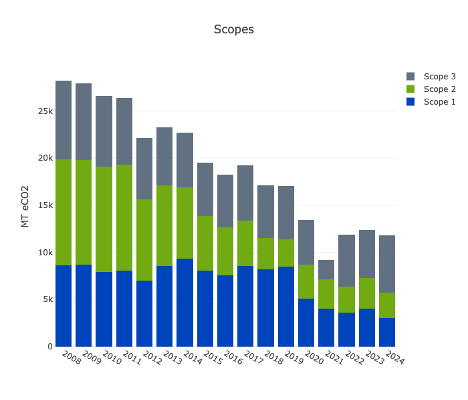
Since 2008, we have reduced our scope 1 and 2 emissions by 71% by linking our climate action into facilities and utilities planning and building a culture of sustainability. This has included updating our district heating and cooling system, which incorporates a geothermal system.
Sustainability in Our 2025 Campus Facilities Plan
This May, the Board of Trustees approved our 2025 Campus Facilities Plan. The plan identifies immediate and high priority projects, medium priority projects, and long-term priorities informed by our strategic direction, Carleton 2033, and research and community engagement. The Center for Sustainability was identified as a high priority project and the plan notes: “The core programming of the new building will include the relocation of the Arboretum office from its aged and temporary building, while also providing centralized and expanded locations for the Environmental Studies Program, the Sustainability Office, and possibly the Science Education Resource Center (SERC). Right-sized classrooms and laboratories will be incorporated to support the needs of the Center for Sustainability’s programs, while also supporting campus-wide interdisciplinary and collaboration.”
Wind Turbine One- Connecting to Campus and Expanding our Geothermal Capacity
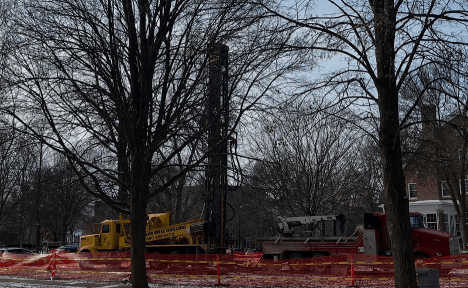
We continue to explore the possibility of connecting Wind Turbine One (installed in 2004) to our campus electric grid, which would provide approximately 20% of the campus’s electricity. In addition, this year we explored the potential for expanding our geothermal system using a Darcy Solutions system (a geothermal energy system design that interacts with the heat in aquifers). Our winter test was successful and we will proceed with installing a Darcy system well near Parish House.
Transportation
Access, Fleet Decarbonization, Electric Vehicle (EV) Chargers
As part of Sustainable Futures commitments we continue to reduce our fleet emissions and to install new EV Chargers on campus. This year that has included new external fleet purchases of a Ford Mustang Mach-E electric vehicle that has a range of 230 miles and the addition of several new EV chargers. In addition, Carleton has improved some of our in town and Twin Cities transportation opportunities in response to student interest and needs surveys and forums held by students (IFSA and Sustainability). For example, Northfield Lines transportation to Dinkytown is now $15 each way using code: CC27923. In addition, Rob Hanson led the development of an updated transportation survey to understand campus commuting practices and inform our emissions reporting.
Net Zero Buildings
Seven of the newly constructed housing units in Lilac Hill are now certified to meet Passive House Institute, U.S. (PHIUS) standards, for its exceptional efficiency including especially thick and insulated walls, air-tight construction, and improved ventilation. Solar panels support energy neutrality and a model for sustainable housing. The Sustainability Office has been sharing fun facts on these buildings as a part of tours and campus visits.
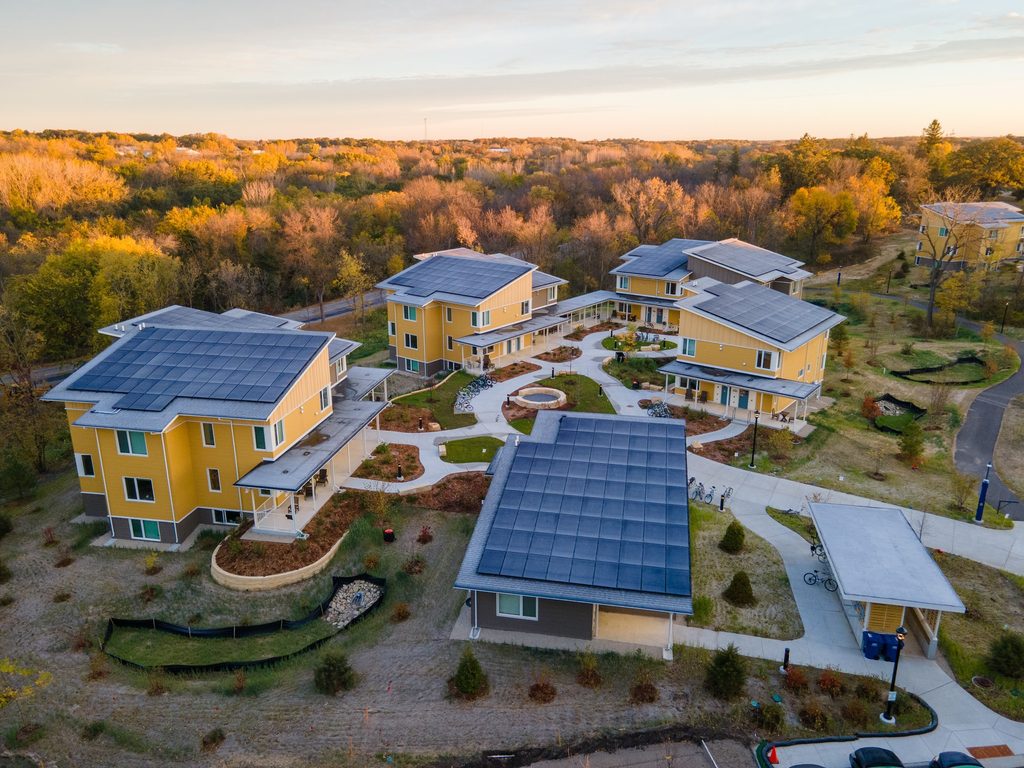
Carleton Student Farm
The Student Farm Interns have just started up our 2025 Season. Farm interns work with Carleton’s new Farm Manager, Amanda Sames, and the Sustainability Office to manage and operate our 1.5-acre plot of land. This year, we have a team of 4 fantastic interns who are diving into the whole experience of running a farm.
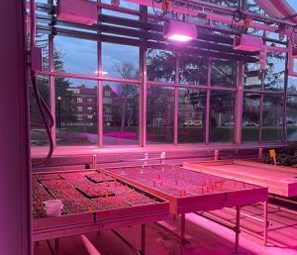
The season kicked off with a trip to the Marbleseed Organic Farming Conference in February, followed by spring crop planning and starting seeds in the greenhouse. We got an early start to the planting season planting apples in April. And now our student farmers are starting to work the soil in preparation for planting! The student farm interns will become full-time farmers this summer, and operate the farm into the Fall Term. Historically, the student farm has grown a variety of vegetables and herbs to sell directly to the campus dining halls. This year, we have a couple exciting changes to the farm.
First, we are very grateful to have received a donation of 28 apple trees from Carleton alum Carolyn Dry ’64. This is our first foray into fruit production or perennial crops, and it’s inspired us to add small plots of strawberries and asparagus near some of the apples as well. This will shift a small amount of our farmland out of annual vegetable production and require new weed and pest management strategies, but if all goes well, it will allow us to offer apples, strawberries, and asparagus for many years to come.
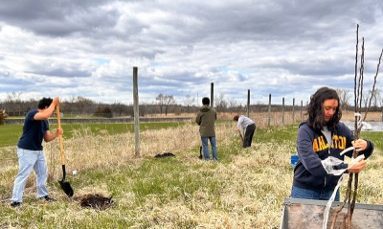
Second, while we will continue to sell produce to the campus dining halls, we will also be implementing a summer food access program for Carleton students on campus over the summer. With support from the Interfaith Social Action student group on campus, we will be providing free produce to students staying on campus over the summer. We know that some students struggle to afford and access food, so we’ve set a goal of donating 10% of our harvest directly to students. All Carleton students are welcome to stop by the farm each week over the summer (weekly days and times to be announced soon) to check out the farm, chat with the student farmers, and take home some fresh produce. We also welcome volunteers!
Follow along with us this season to see what’s growing, learn about volunteer opportunities, and find out what’s on offer through the food access program by following @carletonstudentfarm on Instagram.
Cowling Arboretum: Getting Ready for the 100-year Anniversary
Carleton will celebrate the 100th anniversary of the Cowling Arboretum during the 2026-2027 academic year. One of the aims of the Sustainable Futures Framework is to use this as a moment “to articulate the College’s ongoing commitment.” Projects currently underway include an oral history project to capture how the Arboretum is relevant to our students, staff, faculty, alumni and other communities. A planning committee is developing more opportunities throughout the year that will engage students, faculty, staff, alumni and broader communities.
Student Sustainability Assistants- Peer Leader Program
Sustainability Assistants (STAs) collaborated with many partners and worked together in teams focused on advocacy and community engagement during the election, energy decisions, zero waste, food emissions and equity, AI and data center considerations, and water testing community science engaging for climate resilience and in our riverfront development. The following reports are on special and ongoing projects.
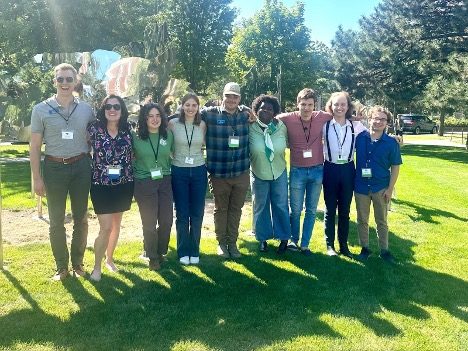
AI & Sustainability
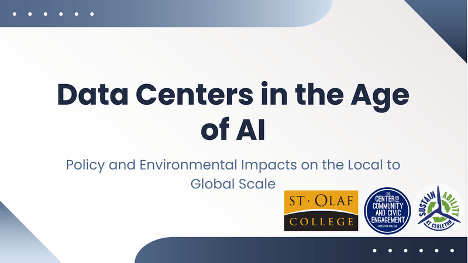
Like most higher ed institutions, Carleton spent this past year exploring how artificial intelligence is changing our academic and everyday lives. In collaboration with the CCCE and students from St. Olaf’s Environmental Studies 237 class, the Sustainability Office researched, synthesized, and presented on how AI data centers are expected to influence Minnesota and Northfield, with a focus on the relevant policy landscape and sustainability challenges associated with energy and water use.
AI data centers use as much power as a small city, require thousands of gallons of water to cool their processors, and create tons of e-waste annually. In addition, St. Olaf students also created a poster of this project for engagement at Northfield Earth Day. Researching and collaborating on this presentation was a fantastic experience, and we hope to continue engaging other on-campus and community organizations on the topic of sustainable AI use in the coming year.
Cannon River Community Science
The Cannon River Community Science team has spent the past year establishing a data collection routine for testing the Cannon River’s water quality and creating outreach materials to share our work with Northfield’s community. We measure dissolved oxygen, turbidity, and temperature, and record visual observations above and below the Ames Mill Dam in downtown Northfield. Nitrates are additionally measured at one site per session given their similarity across sites. We captured our first spring nitrate flush from fertilizer.
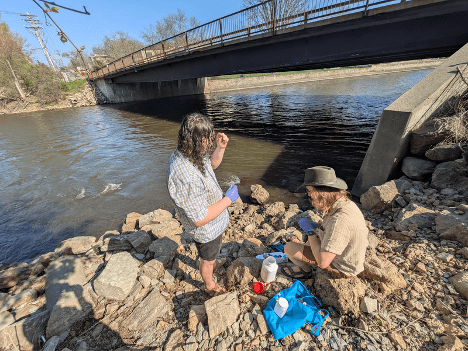
Beginning in September, we did data collection twice a week with the help of Carleton student volunteers, and have gotten back into testing this spring after the Cannon was able to fully thaw. Our team hopes to continue monitoring the Cannon’s water quality in this way for the next several years, contributing to ongoing planning and implementation of the City Riverfront Development.
The City of Northfield is planning to remove the Ames Mill Dam sometime in the near future, so by collecting data now, we should be able to see how replacing the dam with a recreational rapid improves the river’s water quality. We are excited by the related projects conducted in geology, environmental studies, and language courses this year related to the Cannon River.
If you are interested in connecting to this ongoing project and contributing to the education and implementation capacity of riverfront improvements, please reach out to the Sustainability Office (sustainability@carleton.edu) or Sarah Fortner (sfortner@carleton.edu).
In an effort to share our project and initial findings with the Northfield community, our team took part in Northfield’s Earth Day this past April. We tabled at the main event in Armory Square, and had a great time meeting community members who were curious about the Cannon River’s health. We were also lucky enough to be on the “Let’s Adapt: Flooding and Resiliency” panel held at the end of the event. Going into next year, we’re hoping to expand the community engagement side of our water quality project to get more Northfield residents interested in the health of the Cannon River.
Campus Energy Decisions
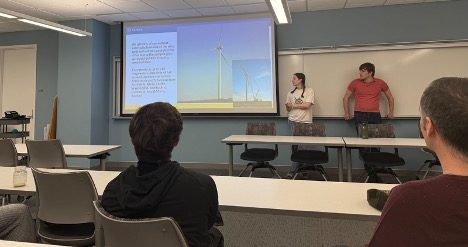
This year, the energy team in the sustainability office worked on a variety of projects. We reviewed charger data from Rob Hanson and calculated how many hours cars were plugged in and charging, how many hours cars were plugged in but were not charging (ie. they were fully charged but still plugged in), and how these two quantities differed between terms, between weekdays and weekends, and during school hours and non-school hours (~8 a.m. to 5 p.m. would be school hours). The data was presented to us in a spreadsheet, with rows representing 15-minute increments with columns for the date, time, and number of cars plugged in and number of cars charging. We brought the data into RStudio, a data science software, and then manipulated the data using different functions in R to improve our analysis that will inform decisions about charger needs.
We also hosted a tour during climate action week of various sustainable energy sources on campus. These include the aforementioned EV chargers, solar thermal and solar PV panels, wind turbines, passive houses, and geothermal systems. We explained general facts about each, and how each is tied to campus along with future plans Carleton has to expand its sustainable facilities, such as connecting our second wind turbine to the campus energy grid, and adding more solar panels around campus. Materials can be updated year to year and inform campus tours by our office or other collaborating offices who are interested in celebrating Carleton’s Sustainability.
Zero Waste
The Zero Waste team worked with Facilities this year on refining their waste-audit program, which gave rise to the Carleton Garbage Wars! Each week for Garbage Wars we audit one dorm’s trash, recycling, and compost to determine what percentage by weight of the waste was mis-sorted. We calculate “contamination” as a percent of the total weight of each waste stream that was incorrectly sorted. If the trash originally weighs 30lbs, for example, but 5lbs of that is recycling and 10lbs is compost then the trash is 50% contaminated.
After an audit one of the Zero Waste team STAs will create flyers to post around the audited dorm reporting the percent contamination of each waste stream and any major contaminants (like drink cans in the trash) that they noticed. We turned audits into Garbage Wars by pairing audits together and making them a competition to see which dorm’s waste was less contaminated. In the future we hope to be able to celebrate winning dorms with pizza parties!
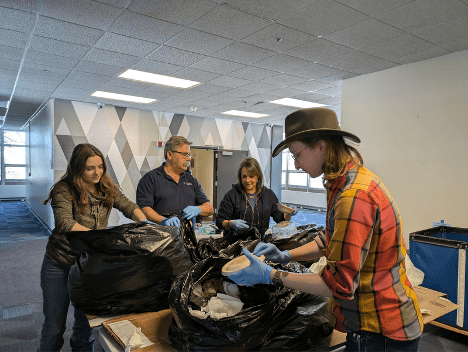
To connect with a wider audience, Zero Waste presented at a Residential Assistant meeting in the winter, sharing with RAs the ways that they can support zero-waste practices in their dorm buildings. Caitlyn McWilliams, ECO president, also worked with the GIS lab and Facilities, especially Wei-Hsin Fu and Rob Nechanicky to create a waste audit dashboard.
For Climate Action Week the team also hosted a panel of local zero-waste experts. Our guests shared information about food waste reduction, waste auditing, and recycling programs. Looking into the future, Zero Waste is planning to continue building these connections with Northfield’s zero-waste activist community so that we can expand our reach beyond Carleton’s community and be part of supporting community-wide intervention such as a single use plastic ban, or community co-created standards for improving purchasing. We’re also hoping to deepen connections with the incoming class of 2029 during new student week, helping them to develop good waste-sorting habits as soon as they reach campus and to also understand other actions they can take to reduce consumption or to understand environmental injustice.
Food Emissions
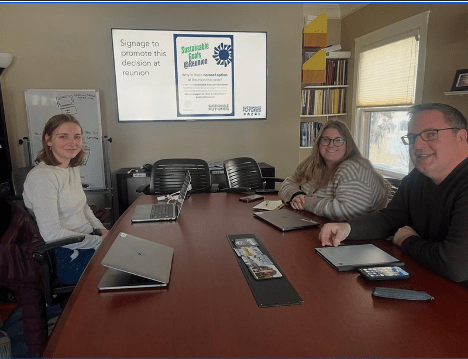
This year the Sustainability Office including Elena Prichard ’25 and Lillian Fisher ’25 partnered with Charlie Schwandt and Laura Lindeman and Bon Appetit Dining Hall Services to target emissions reporting and reductions in Carleton’s dining services. With the help of Bon App’s emissions reporting software the Sustainability Office decided to start by targeting beef which makes up just 4% of our overall food purchasing, but almost 50% of our overall carbon emissions related to food on campus. Interestingly, in our monthly data we were also able to determine that Reunion was a time of especially high beef purchasing and our teams met to discuss alternatives and signage and programming to bring our alumni into awareness of more sustainable food options.
Because both supporting purchasing and student choice are important to change, we have put up signage that informs students of the negative impact of beef production as well as the uneven distribution between the amount of beef purchased and its contribution to emissions. We have especially chosen to target Sayles Hill Cafe, where meals are prepared after ordering, so students can opt out of these choices and limit the amount of beef being prepared here.
Into the future, opportunities include connecting with other campuses to support beef reductions, or plant forward choice making, and analyzing and exploring other high emissions categories like cheese.
Sustainability Communication
The office radio show, Sustaining the Sustainability Office, has enjoyed another year of success and fun. Running all three terms, the show held a 2–3 p.m. time slot on Tuesday and interviewed over a dozen members of the Carleton community across multiple departments.
Some standouts include a get-to-know-you with Devavani Chatterjea, the new director of the Environmental Studies program, and a discussion with Zainab Waheed, a first-year environmental activist that has been recognized internationally for her work on environmental racism in Pakistan.
The show was hosted by Julianna Baldo ’25 and Grace Bassekle ’25 in the fall, Grace Bassekle ’25 and Nico Bolling ’27 in the winter, and Julianna Baldo ’25 and Farren Groom ’27 in the spring. We look forward to you tuning in next year! Reach out if you are willing to be a guest, or would like to suggest a topic.
5th Year Associate, Our Peer Leader Program and Zero Waste Liaison
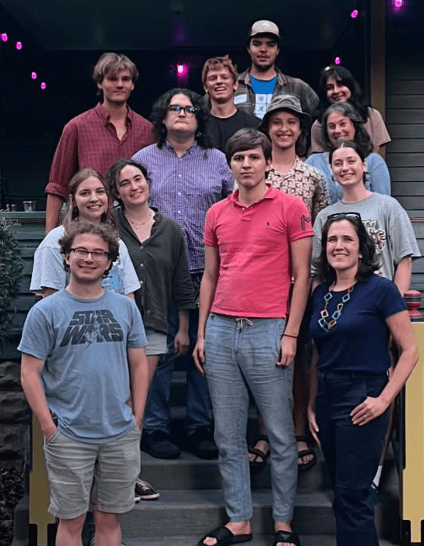
This year the Sustainability Office’s leadership included Demetrius Blackmon-Jimenez ‘24, who brought expertise from the Geology Department into the Sustainability Office. Demetrius served as our liaison to the Peer Leader Program. Additionally, he especially helped coordinate collaboration between the Sustainability Office and partners interested in Zero Waste events and outreach support. He led a webinar with the Minnesota Green Corps and a virtual coffee chat across campuses through UMACS that promoted exchange around Green-to-Go and reusable container and cup practices on campuses.
We appreciate Demetrius’s energy and enthusiasm, knowledge of environmental monitoring, and ability to support our team in its connection to the broader Peer Leader Community and the Division of Student Life through his successful contributions in organizing the Peer Leader Winter Conference and guiding the STAs through New Student Week as they acclimated to their roles as leaders on campus. We will miss you as you go onto new things and wish you joy and happiness with your next steps.
Climate Resilience & Environmental Justice
Carleton College continues to support the city of Northfield’s Climate Action Plan and connect our campus and community in climate action together.
Climate Action Week
This year’s Climate Action Week landed on the fourth week of the Spring Term. Sustainability Assistants hosted tours and panel discussions that they planned the previous term and we included some broader programming as recognition of the “all of campus and into community” climate action work we do across departments and units throughout the year.
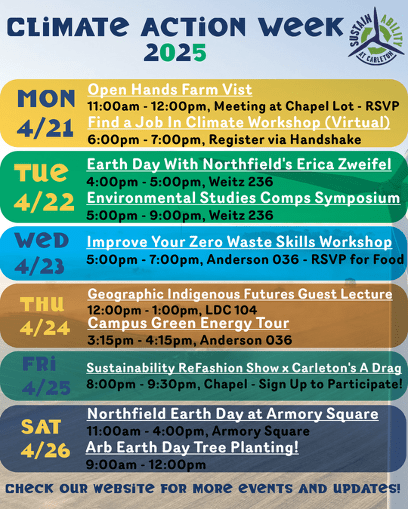
An event to highlight include a panel with Northfield’s Climate Mayor Erica Zweifel, who was involved in the initial drafting of Northfield’s Climate Action Plan and now supports carrying it out. One of the interesting things that we learned was that the city of Northfield will likely need to send waste to a site more than 2 hours away in the 5-10 year future as our landfill reaches capacity. The city is also learning and exploring opportunities to address emergent challenges such as extreme heat and excited with all the ways classes and internships partner to co-advance student learning, shared knowledge, and understanding for projects.
We also heard from local experts from the MN Green Corps and campus experts leading Zero Waste efforts including Rob Nechanicky, Custodial Supervisor and Dennis Wilcox and Jacob Butler former and current Green Corps members. They shared more on local waste related challenges (food emissions, capacity, challenges at the organization scale) and the systems and education Carleton and the community have supported to reduce waste which include many examples over the years (Repair Fair at 50 North, Maker Events, Lighten Up, Trash Talking, and Dorm Wars) and visits to understand local composting, waste management, and state and regional action.
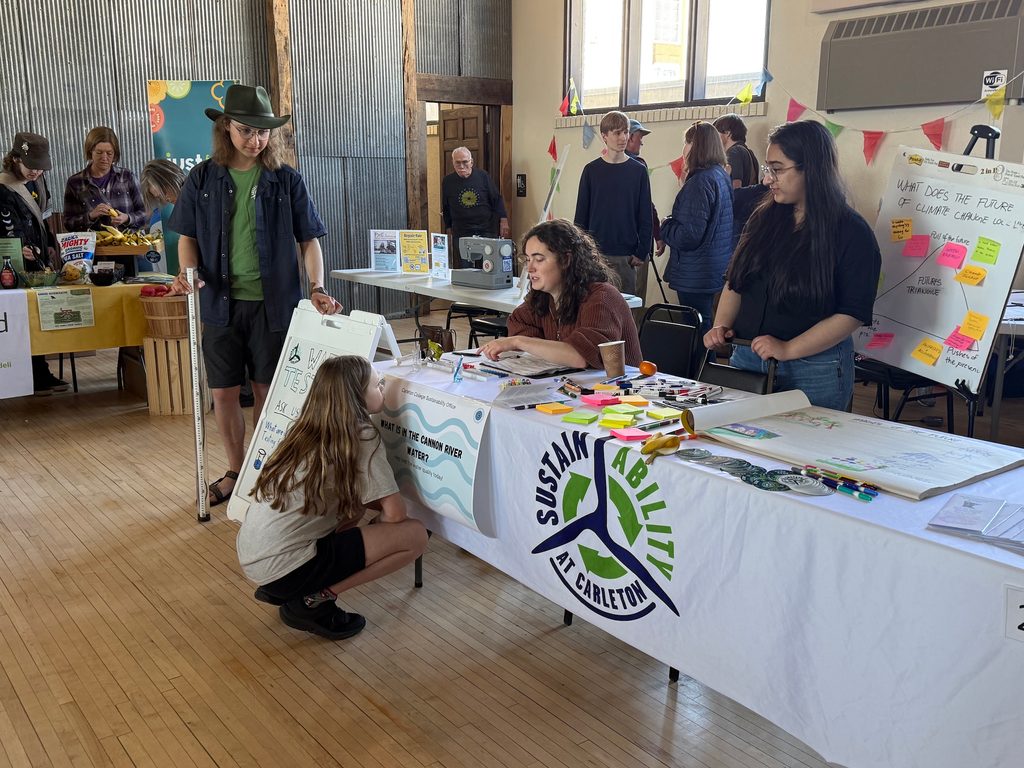
The Environmental Studies Program supported a Geographic Indigenous Futures guest speaker, Dr. Niiyokamigaabaw Deondre Smiles (Leech Lake Band of Ojibwe) and hosted student comps presentations during the week.
The week culminated with Down with Northfield’s Earth Day Celebration a large celebration featured many organizations, local goods and a panel of experts focused on Climate Adaptation, moderated by Mayor Zweifel which the Community Science team participated in to share how they were engaging with our community around water and climate issues. In addition, the Sustainability Office and The Carleton Futures Thinking and Foresight Club co-hosted a table engaging the local community in water quality analyses and a futures thinking activities through the Futures Triangle, where participants thought about their ideal climate future, and how to navigate barriers and opportunities to realize that future.
Community-Engaged Projects
Sustainability Assistants and staff were also part of campus community work this year including supporting CarlsVote and getting the word out about geothermal and the school district sustainability and safety upgrades and Carleton’s support of the ballot measure (which passed, hurray!) and their work contributing to broader programs happening in the community with regularity including Zero Waste Programming and multiple community meetings and focused on Cannon Riverfront Development. In addition we were amongst the many teams supporting Beaver Fest, a student led initiative, which hosted many experts and fun learning stations this year including the Fairfax Beaver Lab, Minnesota Science Museum, Dakota County Parks, Minnesota Department of Natural Resources, Minnesota Trappers Association, Northfield Library and many student projects from the Arboretum, Sustainability Office, and Comps. A core goal of the effort is to “serve as a jumping off point for important conversations about how we as a community should live alongside the natural world.”
Networking and Leadership
We strive to get the word out about the main goals and activities of the Sustainable Futures Framework, to keep up with campus communication on sustainability “everywhere” and to network beyond campus to support broader change. Students and staff work to share examples and strategies from their active work and a broad overview of how many ways Carleton is acting across the curriculum, co-curriculum, and in our collaborations that advance sustainability decisions. We regularly meet with alumni and the communication team to support sharing our stories, or connecting people to the action happening everywhere.
The Voice Winter Issue
This Winter, The Voice, our alumni magazine, featured many stories and highlights on our Sustainability work past, present, and future including highlights on students, faculty, and staff learning and engaging. We highly recommend checking it out and commend The Voice team for their work capturing the personality and human impacts of our sustainability work and celebrating what has already been achieved as well as what is ahead.
Midwest Climate Collaborative Conference
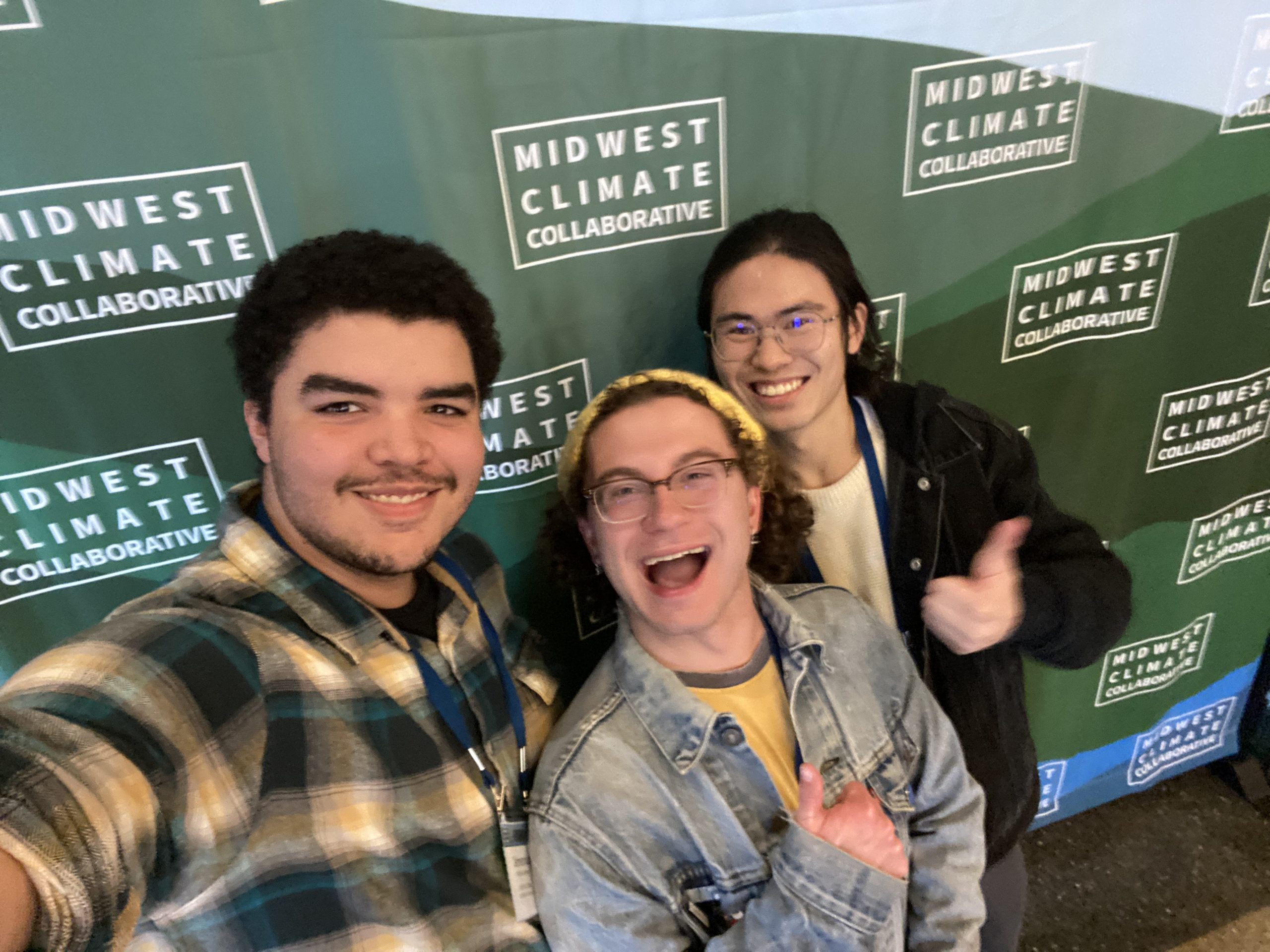
Recently, Demitrius Blackmon-Jimenez ’24 Lillian Fisher ’25 and James Zhang ’26 attended the Midwest Climate Collaborative Summit in Madison, WI.
We were able to attend a day of lectures and workshops on the climate-related issues facing the Midwest, including data center development, and community collaboration on climate projects. Additionally, we were able to attend tours of important sustainability projects in the Madison area, including their waste treatment facility. Finally, we were able to build our office networks and explore career connections with environmental consulting firms and experts in their field from Minnesota and across the region.
American Conference of Academic Deans (ACAD)
This February, Sarah Fortner and Eric Egge hosted an ACAD workshop “Enhancing Sustainability Education and Action” to support reflection by academic administrators on how to support sustainability into education efforts on their campuses. We reviewed big levers for change identified by the National Academies Consensus Study Report on Strengthening Sustainability Programs including professional development, experiential learning, and the partnerships that support applied opportunities for students. Much of our discussion also centered on the challenges and opportunities participants saw on their campuses.
Second Nature Climate Leadership Summit and Climate Luminary Award
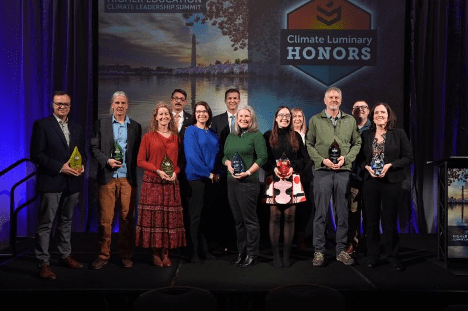
This year Carleton College was recognized by Second Nature with Climate Luminary Honors for Decarbonization and our impressive emissions reductions to date and ongoing commitment through Sustainable Futures. Second Nature also released a report on higher education offset models and hosted a webinar, sharing food recovery carbon offset developed at Carleton by students mentored by Erica Zweifel.
Upper Midwest Association of Campus Sustainability
This year the office presented many presentations and coffee chats throughout the year and in the annual meeting focused. Topics included geothermal energy, spatial tools to support climate adaptation, education ideas for water and climate resilience from Carleton and St. Olaf faculty and staff, to- go containers, and a poster featuring student-led projects at the UMACS meeting at Macalester College. UMACS is also officially transitioning to a non profit organization after more than doubling in size over the last two years. This shift will support more opportunities for contributing campuses to support network activities important to addressing our region specific climate challenges and solutions. UMACS may also be of interest to faculty, staff, and students across the college as a low cost and accessible way to see what others are doing in sustainability. This is one of our favorite meetings for student professional development and networking with other campuses with the many ideas for applied projects, and research completed on campus and community based projects. Next September the meeting will be at Luther College.
Carnegie Elective in Sustainability-Pilot
Many offices and departments around campus are contributing data and examples to the pilot of a Carnegie Elective in Sustainability. Thank you to everyone! We are one of 21 institutions helping to shape this national work that will lead to a new way of recognizing institutions for their holistic sustainability action across education, operations, and community engagement. The new elective won’t be available until 2026 after the pilot concludes and the elective submission process is refined and finalized when we hope to also submit.
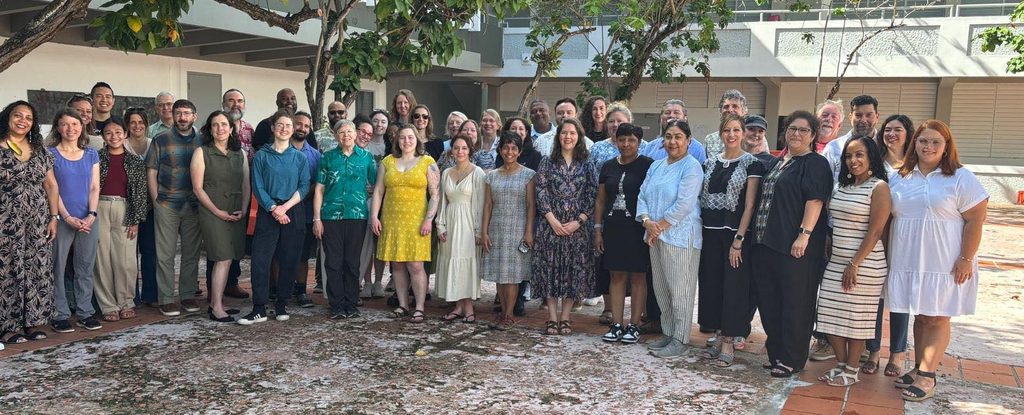
Juneau Icefield Research Program
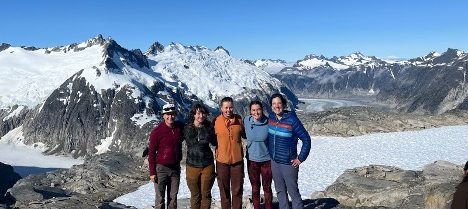
Carleton has a long history of sending students on the Juneau Icefield Research Program (JIRP). Last year three Carleton students attended the program and several alumni joined us throughout the course of the summer. JIRP provides students with a 2-month glacier and climate research experience focused on supporting broad exposure to many field research strategies, analytical strategies and also communication and climate services connecting with downstream community partners. JIRP’s operations director, Annie Boucher Krumdieck, ’11 is a geology grad and Sarah Fortner serves on the academic council team that develops and coordinates academics. Please reach out if your department or program would like to know more or students can set up a meeting directly with Sarah, or be connected with recent participants.
Academics: What’s Now & What’s Ahead
Sustainability Across the Curriculum
Sarah Fortner (Sustainability), Devavani Chatterjea (ENTS), and Emily Seru (CCCE) attended the Centers of Sustainability Across the Curriculum Professional Development last winter to begin planning for Sustainability Across the Curriculum efforts at Carleton College. It was a 6-hour training session that explored foundational models for engaging educators in frameworks and pedagogical approaches to sustainability that included opportunities to explore and make linkages with campus opportunities or interests. The facilitator for our session was Lindsey Lyons, Director of Sustainability Learning, Center for Sustainability Education.
Resource: Dickinson, Valley and Ridge, Sustainability Across the Curriculum
This annual workshop supports curriculum development around place-based and experiential opportunities and has been expanded to invite faculty from many institutions.
Academic Collaboration
The Sustainability Office partners with faculty, staff, and students interested in advancing climate literacy, advocacy, or conducting research or action-focused projects. We can provide climate mitigation and adaptation expertise or provide connections with campus and community climate priorities including buildings and energy, food systems and the farm, transportation, zero waste, and climate adaptation. We welcome meetings with visitors and opportunities to share and learn ideas interactively.
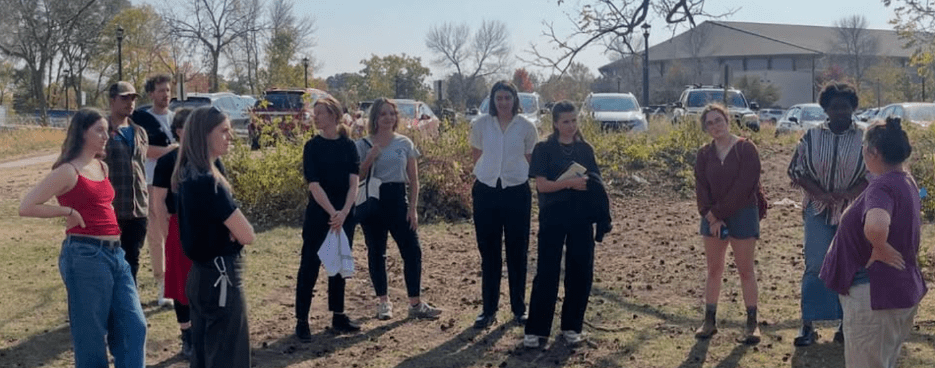
The following are some of the ways the Sustainability Office collaborated with other departments. In addition there were many other sustainability education opportunities and forums and workshops that included sustainability such as classes in the Cowling Arboretum, Civic Engagement courses, and opportunities, FOCUS, the Mellon Indigenous Engagement in Place initiative, and the Day of Public Scholarship, and more within many departments and programs that included examples related to nature, sustainability, Indigenous Knowledge, and climate resilience amongst other foci:
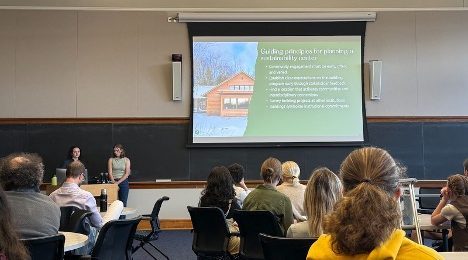
- ENTS 232: Research Methods in Environmental Studies, taught by Mark Kanazawa included several student team projects engaging sustainability including characterizing student attitudes about campus landscapes and community connection, an exploration of pro-environmental attitudes and zero waste practices, and engaging to understand student and community knowledge of campus and public transportation.
- ENTS 289: Climate Change and Human Health, taught by Deborah Gross engaged students with guest speakers throughout the term who engaged students in activities exploring systems connections between health and climate. In one activity students learned about big areas of focus in climate mitigation and adaptation that are embedded in our institutional sustainability goals, and parallel goals our city and state have. They then diagrammed climate and sustainability related learning opportunities on campus and generated ideas about what else could be added or connected. For example, food systems ideas included classes in Biology, Geology, SOAN, OCS experiences, sustainability, farm, and CCCE internships, Bon Appétit internships, student organizations like FRN and students imagined fun spaces and new ways to connect.
- ENTS 395: ENTS Senior Seminar, taught by Mark Kanazawa included were all co-advised to and included a breadth of environmental topics. Students developed wonderful projects and Grace Rogers and Elena Prichard developed research specifically of interest to Sustainable Futures and a new Center of Sustainability. They researched perspectives from faculty, staff, and students at Carleton and at other campuses relevant to informing the design and function of our future Center for Sustainability. From this they produced guiding principles for planning a center.
- IDSC 110: Thinking with Numbers, taught by Lin Su Winton, is the Fall component of Carleton’s Undergraduate Bridge Experience (CUBE), which develops students’ quantitative skills and connections to campus. Through discussion and hands-on learning, Farm Director Dr. Amanda Sames helped students explore issues of agricultural labor and food justice. Under a sprawling shade tree adjacent to farm equipment and vegetable plots, students applied their problem-solving skills to the real-world problem of setting prices: by estimating picking rates, what customers might pay, crop weight, and a living wage, students proposed reasonable prices for a pound of green beans. Students then tested their proposals by seeing how many beans they could pick in a few minutes and weighing their harvests. As we crunched on the sun-warmed fruits of our labor and returned to our calculations, the numbers took on new weight, and we considered the differences between the monetary price of food, the students’ expectations, and the true cost of labor.
- PHIL119: Meaning of Life, taught by Hope Sample has a unit on end-of-life, for which there was a guest speaker Crystal Scott-Tunstall. Crystal is a sustainability expert from Grand Valley State University who lectured on repast, an African-American funeral meal practice. After Crystal’s lecture and discussion, the class had a repast experience catered by Soul Bowl. Crystal honored her mother, sharing both pictures and family stories. Further, she invited students to share their condolences for her loss and also share memories of their loved ones. Overall, it was a joyful celebration of life and connection. Beyond her visit to the Meaning of Life class, Crystal met with students that work with Carleton’s farm to talk to discuss issues related to sustainability and partnerships in food justice.
- SPAN 320: Death and Dying Under Capitalism: An Ecological and Humanistic Perspective, taught by Palmar Álverez Blanco incorporated a unit exploring “death in rivers” Students in the class engaged community members to learn local perceptions of river history and health, and then they heard from the sustainability office the including about “death in rivers” including destruction and water quality challenges associated with flooding, drought, increasing temperatures, excess nutrients and dams. They learned about ongoing water quality monitoring interns are completing, and contributed to the needed education and advocacy to support riverfront development. They then developed posters in both Spanish and English engaging the Ames Mill Dam Removal. This class plans to incorporate a longer quest to support the rights of the Cannon River
- GER 240: Half Lives: Science, Protest, and Nuclear Power in Germany, taught by Kiley Kost incorporated a reading of Beginning to End the Climate Crisis by climate activist Luisa Neubauer in winter term, following a fall term visit and public talk, “Organizing for Climate Justice in Germany and Beyond” by both Luisa Neubauer and colleague Helena Marschall. During their visit hosted by Kiley and the German Department the two climate activists met with many student groups on campus and discussed the climate related activities on campus, in our community, and at state and federal levels with our students. We had a fun time visiting with them at the farm and on a tour of campus energy. It was a great way to celebrate youth leadership and capacity to mobilize for change. Examples shared were personal and relatable to anybody trying something new and getting better with their friends, persistence, and a desire for a more just world.
- Building Climate Literacy for Decision Making, led by Deborah Gross, Chemistry, Sarah Fortner, Sustainability, and Jennifer Tonko, Clean River Partners explored hosted a LTC workshop focused on climate literacy, we engaged participants in reflection of big challenges we face and how to support and approaches including systems thinking, scaffolding to build expertise to move from learner to proactive problem solving, and reflection that supports connecting with students and their interests and identities. Many of the ideas drew from the Science Education Resource Center (SERC) led NSF InTeGrate Project, which developed open education and a national community of educators using resources that support student learning gains and attitude shifts for a sustainable future.
Funding & Recognition
Minnesota Local Climate Action Grant
As Sustainable Futures a deepened focus on climate resilience and environmental justice, we are increasing our curricular and local partnerships to meet new needs, especially as flooding amplifies and water resources face new strains from AI and deregulation.
The Sustainability Office, Geology and Spanish Departments, and Environmental Studies Program, collectively contributed to a successful MN Pollution Control Agency Local Climate Action grant led by Clean River Partners which supported K-12 education, new water quality monitoring efforts engaging our community in water and climate resilience discussions about the Ames Mill Dam removal and climate mitigation and adaptation discussions with the broader community to engage to advance our climate riverfront development project. Activities in the grant or related to it included:
- Establishing a Carleton student-led Community Science project for monitoring and community engagement that engaged campus, GreenThumbs (schools), & BeaverFest (public).
- Installing temperature and oxygen sensors above and below the dam.
- Developing new water rangers activities in Northfield Public Schools
- Hosting community forums to build our water and climate resilience collaboration.
- Student and community engagement in SPAN (320)
- Let’s Adapt Forum and booth to engage public audiences at Northfield Earth Day (April)
- Professional Development on Climate Literacy at Carleton through the LTC (April)
- Professional Development through UMACS: Big Ideas and Tools to Support Midwest Climate Resilience with collaborating colleges and follow-up workshop and booth planned for annual meeting to help colleges partner locally for resilience.
- Climate Mitigation and Adaptation Convening led by local organizations (May)
- Clean River Partners Annual Meeting featuring sharing of nearby DNR funded rock rapid installations and dam removals that are similar to what is proposed for Northfield.
- Planning meetings led by the city to develop more ideas on the project management and support for moving forward the dam removal and riverfront upgrades (ongoing).
Please reach out if you want to join our listserv and hear updates on projects and ways to participate led by partners and our campus. OR if you are eager to contribute or develop student projects connected to this work, please reach out to the Sustainability Office. The Sustainability Office is curating connections and exploring ways to be good partner in building and supporting climate-community literacy in the riverfront development project. In particular, the city and our community partners would be excited to see students complete projects that help to understand the environmental impacts of the dam removal and that support ongoing change as we develop new recreational and economic opportunities, landscapes, access and equity. We are part of larger campus-community efforts engaging water issues and excited to learn and share in this space.
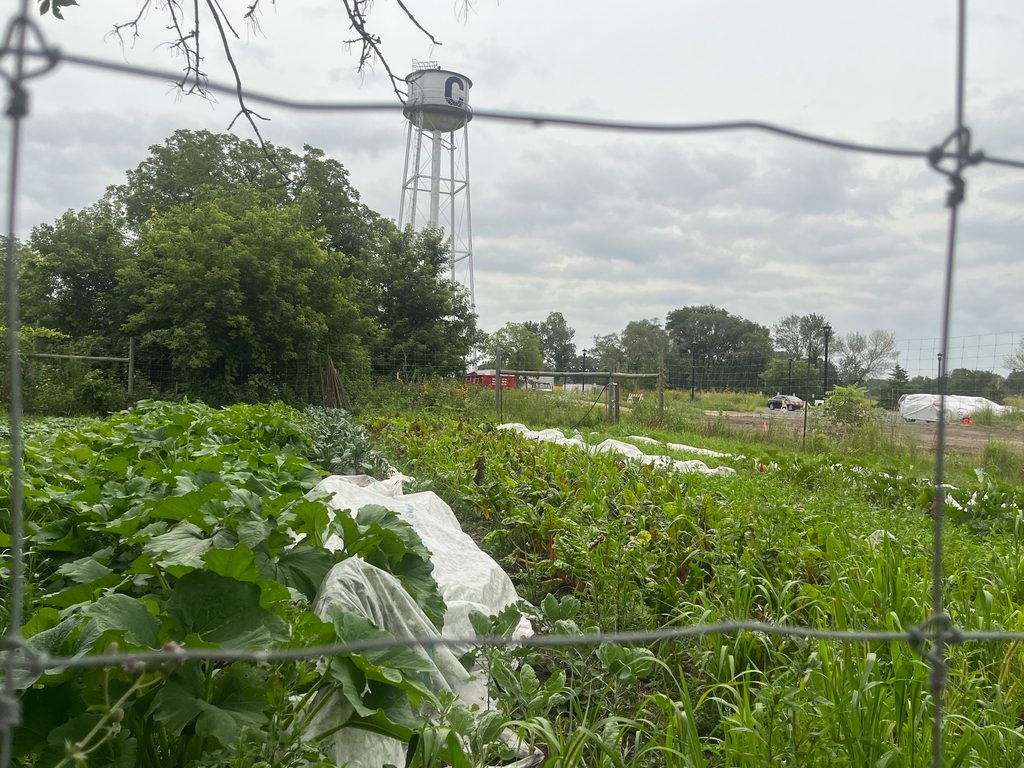
Urban Farm Conservation Mini-Grant
Amanda Sames led a Minnesota Department of Agriculture Mini-Grant that supports a new composter at the Carleton Student Farm to help manage crop waste. Student farmers will build and start using the system this summer. This project builds from strong student interest in on-site composting and support for our growing local compost efforts.
Carleton Birder Window Decal Project
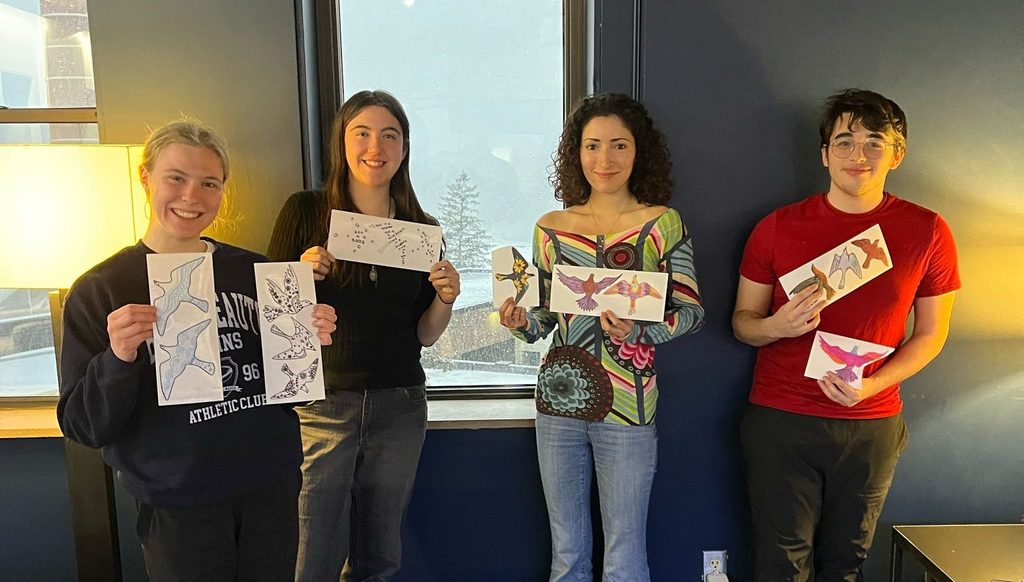
The Sustainability Office awarded one project fund to the Carleton Birders to support the labor of installing stickers on windows across campus with decal funds provided by CSA. Bird window collisions are a detrimental problem both on campus and worldwide, especially given our campus’ proximity to the arb, where migratory birds pass through in large quantities. Carleton Birders have been working closely with facilities, the Sustainability Office, and arboretum director Nancy Braker to identify the most lethal windows on campus, explore solutions, and develop a monitoring and management plan to assess their pilot. These stickers will help prevent countless bird deaths by making window glass less reflective — just in time for spring migration! Our project is a momentous step toward furthering Carleton’s sustainability efforts towards avian conservation. We hope our stickers will spark conversation and raise awareness of the over one billion birds that collide with windows daily in the U.S. alone.
Stewsie Award Winners: Rob Nechanicky and Julianna Baldo ’26
Every year, we award the Stewsie Sustainability Award to one Carleton student and one Carleton faculty or staff member who has made a notable impact on sustainability efforts at Carleton. The Award is named for Dresdon Blake Stewart, better known as “Stewsie.” Stewsie served the College for more than 50 years and served as a grounds supervisor.
Rob Nechanicky

This year we are honoring Rob Nechanicky, Custodial Services Supervisor, with the Stewsie Award for his work as a key member of the Wastebusters Program.
In his work in the Wastebusters Rob worked to unite custodians and students in an effort to build awareness of sustainability practices that inform ideas of reducing consumption and purchasing, and improve waste management such as three bin sorting and improving sporting events with targeted outreach and trash talking. The last couple of years also included supporting the reintroduction of waste audits to buildings on campus and even being featured in a few events on campus to bring zero waste initiatives to border student and public audiences, this included presenting at an RA training and being featured panelist for Climate Action Week’s “Improve Your Zero Waste Skills” workshop. His commitment to improving Carleton’s zero waste practices is truly inspiring, and he brings not only hard work and problem-solving but also the enthusiasm that Dr. Blake Stewsie showed in his work and life. His kindness and energy for supporting our community and students make him a truly deserving winner.
Julianna Baldo ’25
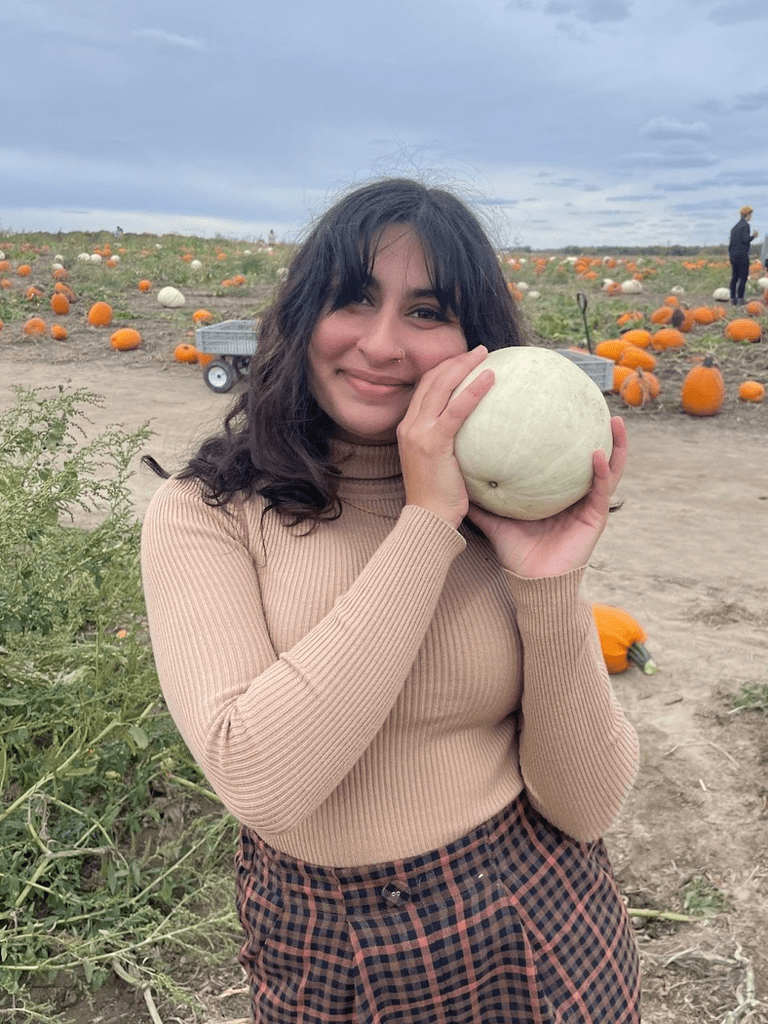
In recognition of her remarkable dedication to environmental activism, education, and community engagement throughout her time at Carleton, Julianna Baldo, Environmental Studies and Sociology/Anthropology double major and Sustainability Assistant (STA), has been chosen as the student awardee for the Stewsie Award.
Julianna began some of her sustainability and environmental justice work at Carleton as a summer intern on the student farm, where she helped develop and carry out a strategy for growing and selling food on campus and reflecting on campus and local food sustainability and equity interests. As a leader in the Sustainability Office, Julianna has been instrumental in initiatives from Zero Waste by not only performing waste audits but working to help educate but integrate zero waste practices into the greater Carleton community. Outside of her work as a STA, Julianna is passionate maker and advocate for sustainable fashion, sharing her infectious enthusiasm for mending and up-cycling by organizing Repair Fairs where students learned how to alter and repair their clothing to fight fast fashion. She also played a vital role in planning Mutual Aid Art Fairs to raise money for Carleton Mutual Aid. Her drive, sincerity, ability to inspire others and her unwavering commitment to this cause embodies the spirit of the Stewsie Award.
Senior Reflections
Students working in the Sustainability Office reflect on what they appreciated most and where they are headed next.
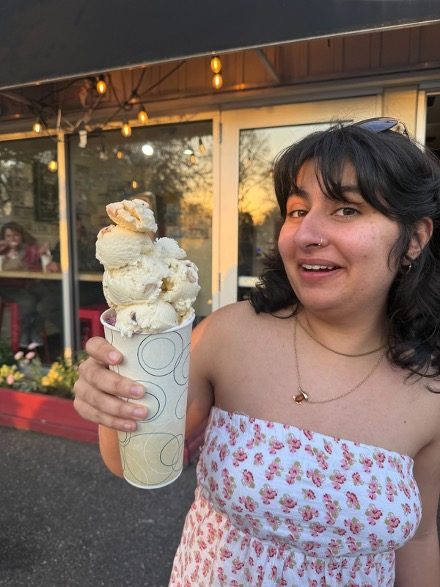
Julianna Baldo ’25, Environmental Studies and Sociology and Anthropology
One of my favorite memories from the sustainability office was interviewing guests on our weekly radio show! It was a great way to connect to the broader campus sustainability community outside the office. I am planning on attending graduate school in social work next!
Sadie DiCarlo ’25, Geology
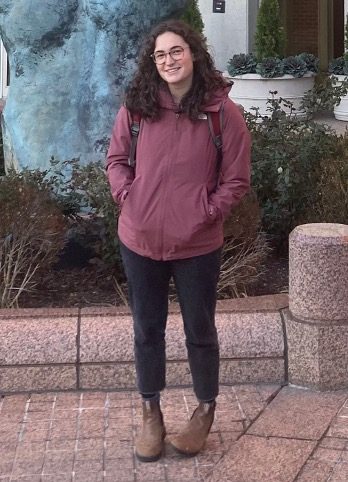
Next year I will be completing a research Fulbright in Reykjavik, Iceland, studying glaciovolcanic formations as analogs for analyzing Martian paleoenvironments.
My favorite project that I’ve worked on for the Sustainability Office has been the community science project. It’s been so cool to follow a project from the very early planning stages through to a fully functioning research project with data and preliminary results! I’ve learned so much about how to conduct a long-term research project, and I’ve loved being able to connect with students and Northfield residents over science and climate resilience.
Lillian Fisher ’25, History
I found the professional development opportunities through the Sustainability office very meaningful! Through our work we have been able to build a resume of project development, we have been able to meet other climate and sustainability related organizations in Northfield through the Climate Action Week and Northfield Earth Day programs, and we have been able to meet professionals in our area through the Midwest Climate Collaborative Summit and the Upper Midwest Association for Campus Sustainability Conference. Aside from that work I have been very excited to see the office’s community science initiative grow, as we have continued to collect data and are considering expanding what data we collect and how we collect it!
I am excited to join the Sustainability office as the fifth year coordinator this coming school year as I continue to explore what my degree and career connections can bring in the field of sustainability, nonprofit development and public services and relations work. Additionally, I am always working on some form of community organizing and activism often related to climate or with an eye towards preparing for the impacts of climate change.
Elena Prichard ’25, Environmental Studies
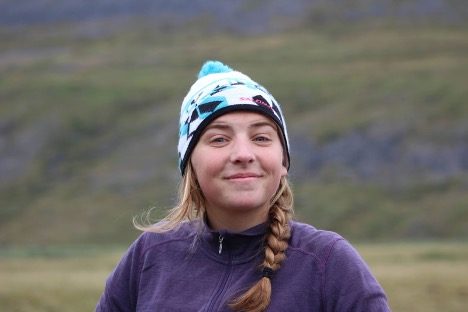
I have really enjoyed getting to understand sustainability at a smaller scale like Carleton, and interacting with other schools in the area.
Next year I will be applying to graduate school in environmental architecture and urban planning while traveling as much as possible.
Grace Bassekle ’25 (Winter), Sociology and Anthropology
Grace (far right) organized a spring break trip to visit with the Macalester Sustainability Office in March 2024 and launched an improved focus on mutual aid and justice through communication including our radio show.
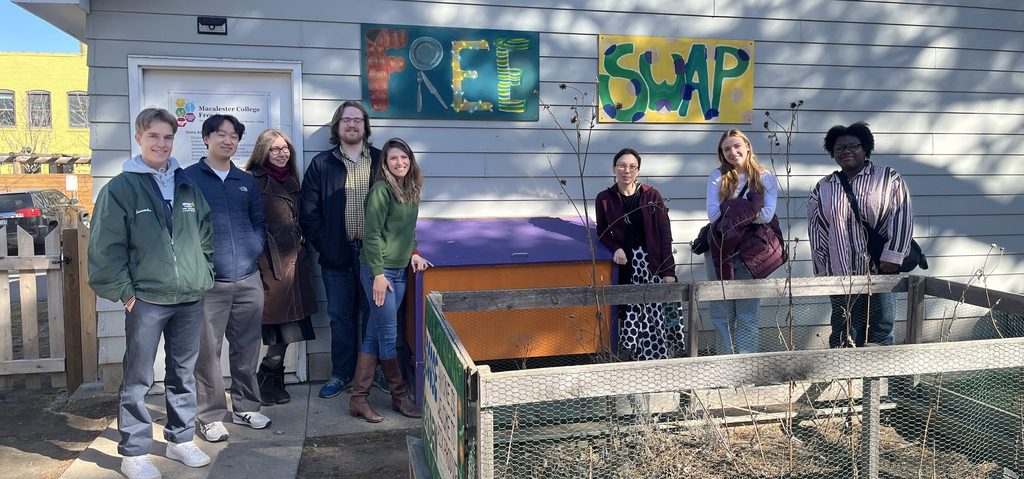
Eli Watt ’24 (Fall), Environmental Studies
Julianna Baldo ’24 and Eli Watt ’24 (right) supporting mending activities. Eli worked on many projects at the intersection of sustainability and health equity from a project on free and sustainable detergent to many events supporting mutual aid and reuse.
